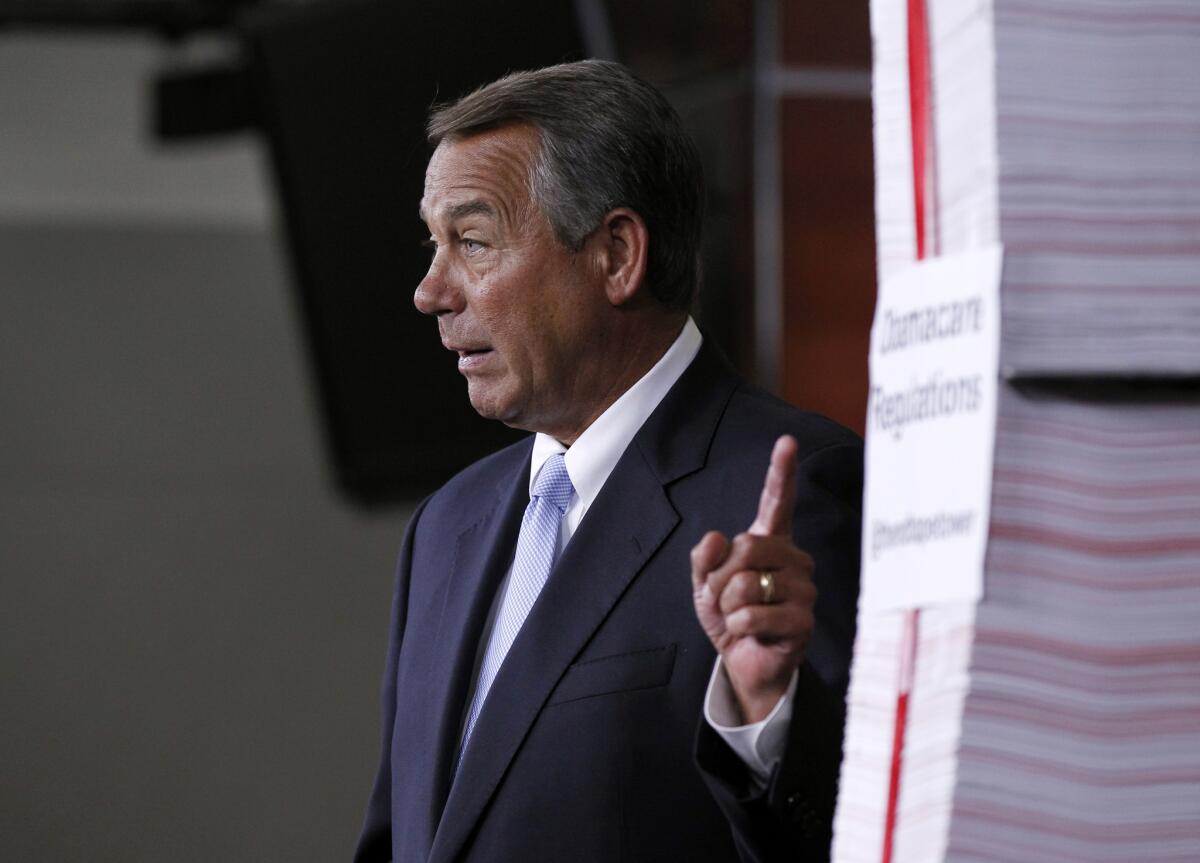Obamacare’s troubling, stumbling start

- Share via
The Obama administration has conceded that it wasn’t ready to proceed with at least one part of the Patient Protection and Affordable Care Act, a.k.a. Obamacare: the requirement that companies with 50 or more employees provide coverage to their workers. Now the question is, how many more provisions will fall by the wayside as Jan. 1, 2014, approaches?
Mark J. Mazur, an assistant Treasury secretary for tax policy, announced Tuesday that the administration wouldn’t enforce the employer mandate until 2015. The Internal Revenue Service will need employers and other providers of insurance to submit reports identifying the people who had coverage each month as required by the Affordable Care Act. But although the administration may offer guidance within a week about how to file the reports, Mazur said Treasury wouldn’t issue the rules for them until later this summer, after it talks to stakeholders about how to minimize the burdens imposed.
The administration still plans to urge businesses to comply voluntarily with the reporting requirement and insurance mandate. But in tacit acknowledgment of the need for more time to work out any kinks, Mazur said, “Real-world testing of reporting systems in 2014 will contribute to a smoother transition to full implementation in 2015.”
And as long as reporting is merely voluntary, Mazur wrote, it’s “impractical” to try to figure out which employers haven’t complied with the law’s insurance mandate. “Any employer shared responsibility payments will not apply until 2015,” he concluded.
Predictably, opponents of the law said the delay was a sign that the measure was unworkable, while supporters shrugged it off. Anthony Wright, executive director of Health Access California and one of the latter, said: “This employer responsibility provision was meant to stabilize on-the-job benefits that have eroded over the last few decades, especially here in California. One year to phase in the employer requirement shouldn’t harm the goals of the Affordable Care Act, but a multi-year delay or disruption could undermine the financing of our health system. This provision in needed to make our health system sustainable in the long term, so employers don’t shift the health costs of their workers onto taxpayer-funded programs.”
Two unanswered question about the temporary shift to voluntary reporting are whether it would undermine the new state insurance exchanges or nullify the IRS’ enforcement of the requirement that virtually all adult Americans obtain coverage. For his part, Mazur insisted that no other provision of the Affordable Care Act would be affected. But the exchanges are supposed to offer premium subsidies only to those who can’t obtain qualifying insurance coverage through their employers. How are the exchanges supposed to determine who’s ineligible if some employers aren’t filing reports? And if neither employers nor insurers are required to disclose who has coverage, how will the IRS be able to know who isn’t complying with the individual mandate?
It’s hard to fault the administration’s rationale for delaying the reporting requirement. Nevertheless, this is an expensive failure, costing the government billions of dollars in forgone tax penalties. Under the Affordable Care Act, companies with more than 50 employees working at least 30 hours a week must pay the IRS $2,000 per worker if they fail to provide insurance coverage that meets federal standards. The penalty is considerably smaller in 2014 for individuals who don’t carry insurance, although it rises to a maximum of $2,085 in 2016 for those with at least $83,400 in taxable income.
Mazur’s announcement wasn’t the only sign of trouble ahead for Obamacare. Three months ago the administration said that small businesses buying insurance for their employees through state exchanges would have only one option for coverage until 2015. Under the law, those businesses were supposed to have multiple options available in 2014.
The Government Accountability Office also issued a cautious report recently on how much progress the Department of Health and Human Services had made toward opening insurance-buying exchanges in 34 states -- a crucial feature of the Affordable Care Act because the exchanges are the only place where individuals will be able to shop for subsidized insurance policies. Although the agency insisted it was on track despite missing several interim deadlines, the GAO warned that “much remains to be accomplished within a relatively short amount of time.”
Getting off to a good start is more important to the success of the new law than meeting somewhat arbitrary implementation deadlines that Congress set in 2010. And if we had a functional national legislature, lawmakers would be holding hearings right now on how to avoid the “huge train wreck” that Sen. Max Baucus (D-Mont.), one of the law’s main Senate sponsors, warned about at a hearing in April. (Baucus was concerned that HHS wasn’t getting enough information to the public about the law’s benefits and requirements.)
Instead, lawmakers have spent their time debating proposals by House Republicans to repeal the law, defund it or stop the administration from explaining its features to the public. So with Congress on the sidelines, it will be up to the administration to decide how much of the new law is ready to implement.
ALSO:
Seize the mortgages, save the neighborhood
It’s no joke: Morsi gets two days to solve Egypt’s problems
Vatican infighting: We told you two popes could be a problem
Follow Jon Healey on Twitter @jcahealey
More to Read
A cure for the common opinion
Get thought-provoking perspectives with our weekly newsletter.
You may occasionally receive promotional content from the Los Angeles Times.











